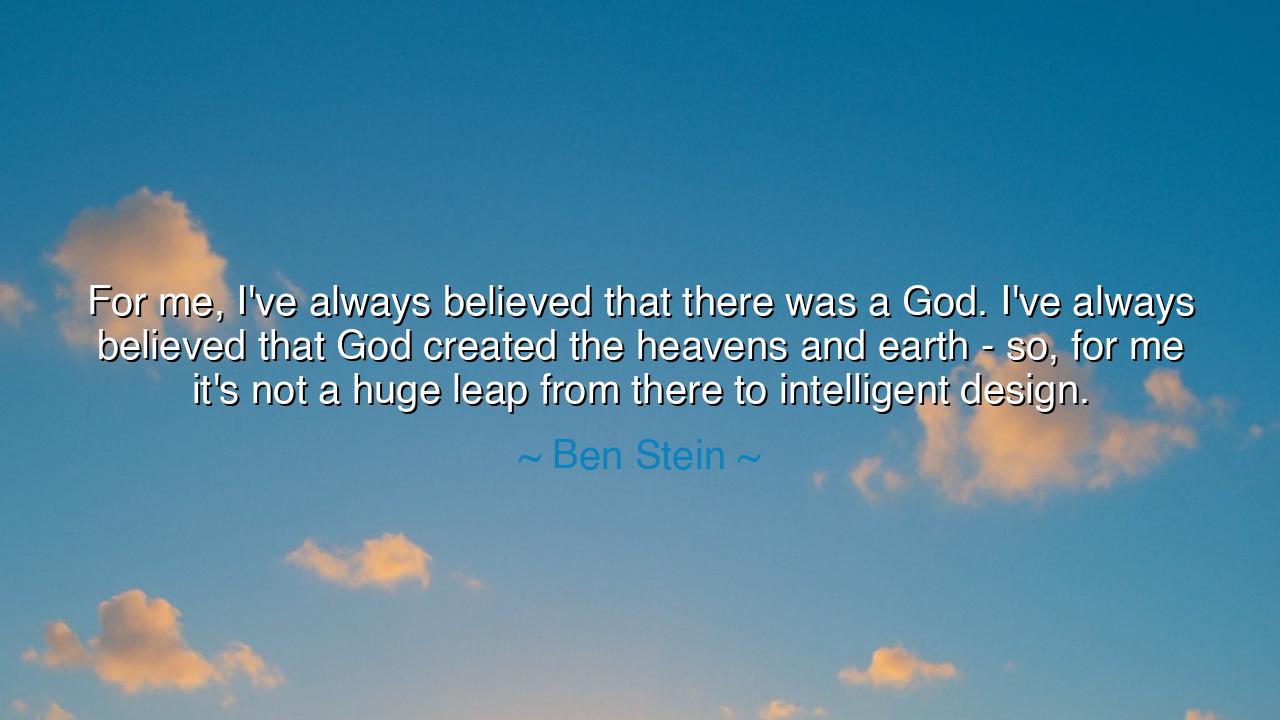
For me, I've always believed that there was a God. I've always
For me, I've always believed that there was a God. I've always believed that God created the heavens and earth - so, for me it's not a huge leap from there to intelligent design.






“For me, I've always believed that there was a God. I've always believed that God created the heavens and earth—so, for me it's not a huge leap from there to intelligent design.” Thus spoke Ben Stein, a man of intellect and faith, seeking to reconcile reason with reverence, and inquiry with awe. His words echo across the centuries, joining a chorus of philosophers, poets, and prophets who have gazed upon creation and felt the pulse of intelligence within its vast design. In this single utterance, Stein bridges two worlds—the world of science, ever probing for cause and pattern, and the world of faith, ever seeking purpose and meaning.
To believe in God as the maker of the heavens and earth is among the oldest affirmations of humankind. Long before telescopes traced the stars or microscopes unveiled the cell, the ancients stood beneath the firmament and felt the majesty of the unseen hand that shaped it. From the deserts of Mesopotamia to the temples of Greece, from the scriptures of Israel to the hymns of India, one truth arose in many tongues: that life is not random chaos, but divine order. Ben Stein’s belief in intelligent design thus springs from this ancient root—the conviction that creation bears the signature of its Creator, that behind the complexity of the universe stands not chance, but consciousness.
The phrase “intelligent design” is modern, but the thought behind it is ancient as the stars. It is the intuition that purpose breathes through all things—that the spiral of a galaxy and the spiral of a shell are written in the same language of wisdom. The great mathematician Isaac Newton, who uncovered the laws of motion, did not see his discoveries as contradictions of faith but as confirmations of it. “This most beautiful system of the sun, planets, and comets,” he wrote, “could only proceed from the counsel and dominion of an intelligent and powerful Being.” Newton, like Stein, saw no conflict between mind and spirit, but a harmony between the two.
And yet, Stein’s words carry not merely intellectual reflection—they carry humility. He does not claim to know the mysteries of the divine; he simply acknowledges that for one who already believes in a Creator, it is no great leap to see design in creation. It is an argument born not of arrogance, but of wonder. He looks upon the heavens and the earth—their beauty, their order, their intricate balance—and feels that such things could not have arisen by accident alone. It is the ancient feeling that moved King David to cry, “The heavens declare the glory of God, and the firmament showeth His handiwork.”
In the modern age, where reason often wars with reverence, Stein’s statement becomes a bridge between the two. It reminds us that faith and intellect need not be enemies, but companions. The mind, when sharpened by curiosity, may uncover the how—but the heart still hungers for the why. To believe in intelligent design is not to reject science, but to see it as a window into something greater. The microscope, like the prayer, is a tool of discovery; both reveal the mystery of existence from different angles.
Consider the life of Albert Einstein, who once said, “The more I study science, the more I believe in God.” He spoke not of a deity confined to temples or dogma, but of a vast intelligence underlying the laws of nature. To him, the universe was not a cold machine, but a symphony. Each equation, each law, was a note in a cosmic score composed by something higher than chance. In this way, Einstein and Stein share a kinship of spirit—a recognition that reason leads not away from wonder, but deeper into it.
From Stein’s reflection we may draw a timeless lesson: Seek truth in all its forms, but do not let pride make you blind to mystery. Whether you gaze at the stars through faith or through formula, let awe be your guide. Do not fear that science will destroy belief, nor that belief will weaken thought. The universe is vast enough for both, for it is the home of questions and miracles alike.
And so, let us live as the ancients once did—curious, reverent, and humble before the infinite. Let us study the heavens not only with our eyes, but with our souls. For whether one calls it God or intelligent design, the truth remains: creation itself is the greatest testament, and to seek understanding within it is the highest act of worship.






AAdministratorAdministrator
Welcome, honored guests. Please leave a comment, we will respond soon